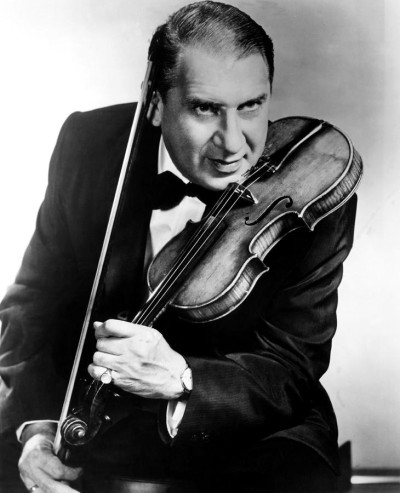Henny Youngman (Henry Youngman)

Youngman was born to a Jewish family in London, England. His family moved to Brooklyn, New York, when he was a child. He grew up in New York City, and began as a comedian after he had worked for years at a print shop, where he wrote “comedy cards” containing one-line gags. The comedy cards were discovered by up-and-coming comedian Milton Berle, who encouraged Youngman and formed a close friendship with him. Berle said about him, “The only thing funnier than Henny’s jokes is his violin playing.” Encouraged by his family to study the violin, Youngman began in show business as a musician. He led a small jazz band called the “Swanee Syncopaters”, and during their performances he often told jokes. One night, the club’s regular comedian didn’t show up and the owner asked Youngman to fill in. He enjoyed it and began his long career as a stand-up comic. His inoffensive, friendly style of comedy kept his audiences laughing for decades. He first played in clubs and speakeasies, but his break came on the Kate Smith radio show in 1937. Youngman’s manager, Ted Collins, booked him on the show, and he made many appearances on the radio. During the 1940s Youngman tried to work into films as an actor, but he found little work in Hollywood. He returned to nightclubs and worked steadily, performing as many as 200 shows a year. Working with writer/producer Danny Shapiro, Youngman recorded The Primitive Sounds of Henny Youngman a “live” album for National Recording Corporation in 1959 at the Celebrity Club in St. Louis. The album is still popular today in CD, and is a frequent iTunes download.
Like many comedians, Henny Youngman treated his profession as a working job, one where it is difficult to make a living, and getting paid for the work is all-important. In numerous interviews, Youngman’s advice to other entertainers was to “nem di gelt” (Yiddish for “take the money”). He was quoted in an interview with the Web-based magazine Eye: “I get on the plane. I go and do the job, grab the money and I come home and I keep it clean. Those are my rules. Sinatra does the same thing, only he has a helicopter waiting. That’s the difference.” When the New York Telephone Company started its Dial-a-Joke line in 1974, over three million people called in one month to hear 30 seconds of Youngman’s material—the most ever for a comedian. Youngman made numerous appearances on television, including a long-running stint on Rowan and Martin’s Laugh-In. In 1955 he was host of a TV series titled The Henny and Rocky Show, appearing with champion boxer Rocky Graziano. He had cameo appearances in several movies, including Won Ton Ton, the Dog Who Saved Hollywood, History of the World, Part I and Goodfellas. He had a larger role as the strip club owner in Herschell Gordon Lewis’s The Gore Gore Girls, a fact he denied vehemently.[citation needed] He made a few recordings, most notably The Primitive Side of Henny Youngman, recorded “live” in St. Louis and released by National Recording Corporation on the NRC label. The CD is still in print. His published autobiography is entitled Take My Life, Please!. Youngman’s last movie appearance before his death was in the Daniel Robert Cohn film Eyes Beyond Seeing, in which he has a cameo as a mental patient claiming to be Henny Youngman.
Youngman’s wife, Sadie Cohen, was often the butt of his jokes (“My wife said to me, ‘For our anniversary I want to go somewhere I’ve never been before.’ I said, ‘Try the kitchen!'”, or “my wife’s cooking is fit for a king. (gesturing as if feeding an invisible dog) Here King, here King!” Also, “Last night my wife said the weather outside was fit for neither man nor beast, so we both stayed home.”) but in reality the two were very close, with Sadie often accompanying her husband on his tours. Youngman remained married for over sixty years until his wife’s death in 1987, after a prolonged illness. While she was ill, Henny had an ICU built in their bedroom, so she could be taken care of at home, rather than in the hospital (Sadie was terrified of hospitals). Henny explained the origin of his classic line “Take my wife, please” as a misinterpretation: he took his wife to a radio show and asked a stagehand to escort his wife to a seat. But his request was taken as a joke, and Youngman used the line countless times ever after. Youngman had two children, son Gary and daughter Marilyn. Gary started his career screenwriting and directing, and thereafter continued to work in the film industry in various capacities. Gary is best known for his 1976 film Rush-It!, which introduced the filmgoing public to a number of soon to be very famous actors and actresses (John Heard, Jill Eikenberry, Tom Berenger [in his debut part], and others). After Rush-It’s lukewarm reception, Gary removed himself from the public eye—he then lived a quiet life in California. With the exception of a week following his wife’s death, and the month he was in his final hospital stay, Henny was renowned for having worked almost every day for over 70 years without vacations or other breaks. Youngman developed pneumonia and died on 24 February 1998, at the age of 91. He is interred in the Mount Carmel Cemetery, Glendale, New York, next to his wife, Sadie.
Born
- March, 16, 1906
- United Kingdom
- London, England
Died
- February, 24, 1998
- USA
- Manhattan, New York
Cause of Death
- pneumonia
Cemetery
- Mount Carmel Cemetery
- Glendale, California
- USA



